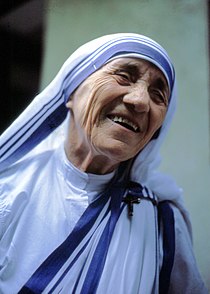találd
ki mi hiányzik, aztán döntsd el, egyetértesz-e Teréz anyával...
a fordítás nem könnyű, szintfelmérésnek is megteszi... próbálkozz :)
segítség a nyelvtanhoz:
* feltételes mód (videó)
* feltételes mód_mondatok
* vonatkozó mellékmondatok_mondatok
Wikipedia: Mother Teresa MC, known in the Catholic Church as Saint Teresa of Calcutta (born Anjezë Gonxhe Bojaxhiu; Albanian: [aˈɲɛzə ˈɡɔndʒɛ bɔjaˈdʒiu]; 26 August 1910 – 5 September 1997), was an Albanian-Indian Roman Catholic nun and missionary. She was born in Skopje (now the capital of the Republic of Macedonia), then part of the Kosovo Vilayet of the Ottoman Empire. After living in Macedonia for eighteen years she moved to Ireland and then to India, where she lived for most of her life.
In 1950 Teresa founded the Missionaries of Charity, a Roman Catholic religious congregation which had over 4,500 sisters and was active in 133 countries in 2012. The congregation manages homes for people dying of HIV/AIDS, leprosy and tuberculosis; soup kitchens; dispensaries and mobile clinics; children's- and family-counselling programmes; orphanages, and schools. Members, who take vows of chastity, poverty, and obedience, also profess a fourth vow: to give "wholehearted free service to the poorest of the poor".
Teresa received a number of honours, including the 1962 Ramon Magsaysay Peace Prize and 1979 Nobel Peace Prize. She was canonised (recognised by the church as a saint) on 4 September 2016, and the anniversary of her death (5 September) is her feast day.
A controversial figure during her life and after her death, Teresa was admired by many for her charitable work. She was praised and criticised for her opposition to abortion, and criticised for poor conditions in her houses for the dying. Her authorised biography was written by Navin Chawla and published in 1992, and she has been the subject of films and other books.
One of Teresa's most outspoken critics was English journalist, literary critic and antitheist Christopher Hitchens, author of the essay The Missionary Position: Mother Teresa in Theory and Practice (1995), who wrote in a 2003 article: "This returns us to the medieval corruption of the church, which sold indulgences to the rich while preaching hellfire and continence to the poor. [Mother Teresa] was not a friend of the poor. She was a friend of poverty. She said that suffering was a gift from God. She spent her life opposing the only known cure for poverty, which is the empowerment of women and the emancipation of them from a livestock version of compulsory reproduction." He accused her of hypocrisy for choosing advanced treatment for her heart condition.

Nincsenek megjegyzések :
Megjegyzés küldése